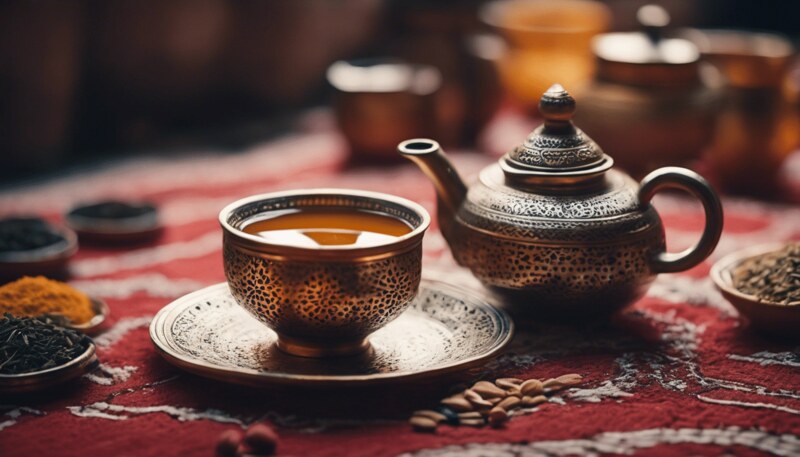Tea, globally famous as a drink, is loved for its variety of tastes and possible health advantages. It has many kinds with distinctive features and impacts. From old customs to present-day wellness fashions, tea remains an important part of different societies. This article will unveil seven astonishing truths about tea, illuminating its advantages and impacts on health, along with the various sorts present.
The Variety of Tea Types
Tea comes from the Camellia sinensis plant. Depending on how it is processed, we can get different kinds such as green tea, black tea, white tea, oolong, and herbal teas. Each has unique taste and health advantages. For example, green tea which contains a lot of antioxidants is frequently associated with better brain operations and losing fat. Black tea, which is completely oxidized, possesses a robust taste and can contribute to heart wellbeing. Oolong tea stands between green and black in terms of oxidation level which gives it an exclusive flavor along with potential metabolic advantages. Herbal teas might not be made from the actual tea plant but they are well-liked due to their calming characteristics and commonly without caffeine content. Understanding these types allows consumers to select a tea that aligns with their health goals.
- Preparation: The method of preparation can influence the taste and health benefits of each type of tea.
- Storage: Proper storage in airtight containers away from light can preserve the quality of tea leaves.
Health Benefits of Tea

Many researchers have looked into the health advantages of consuming tea, showing its capacity to boost general wellness. Habitual tea consumption could diminish the danger of enduring chronic illnesses, such as heart disease and diabetes. Antioxidants found in tea, especially catechins present in the green variant can assist in battling against oxidative stress which is beneficial for cellular well-being. Moreover, it has been proven that some substances in tea can increase metabolic rate and assist in maintaining weight. Including tea as part of a nutritious diet can be an enjoyable way to promote health.
- Variety of Benefits: Different types of tea offer various health benefits; for instance, chamomile tea may aid in sleep while rooibos tea may provide anti-inflammatory effects.
- Quality Matters: The quality of tea can affect its antioxidant levels, with higher-quality loose-leaf teas generally containing more beneficial compounds than lower-quality tea bags.
Caffeine Content and Its Effects
Many people who drink tea value its caffeine content, which can differ depending on the type of tea. For instance, black tea usually has more caffeine compared to green tea, whereas herbal teas mostly do not contain any caffeine. The normal amount of caffeine found in tea is beneficial for enhancing focus and alertness without causing the nervous feeling commonly linked with coffee consumption. Moreover, L-theanine, a type of amino acid in tea, can encourage relaxation and decrease stress. This makes tea preferable for people who wish to achieve a peaceful but alert mental condition.
- Sensitivity: Individual sensitivity to caffeine varies, so some need to monitor their tea intake to avoid potential side effects.
- Timing: Consuming caffeinated tea earlier in the day can help prevent sleep disturbances later at night.
Tea's Role in Hydration
Tea helps in taking daily fluid and can be included as a good method for hydration. Different from the opinion that drinks containing caffeine cause dehydration, studies show moderate drinking of tea does not change hydration conditions. Especially herbal teas could be a superb choice to stay hydrated by giving a tasteful option instead of just water. Including different kinds of tea during the day can improve hydration and perhaps offer health advantages.
- Balance: While tea can aid hydration, it should not replace water entirely in one's diet.
- Temperature: Drinking hot tea may be less hydrating than iced tea due to the body's energy expenditure to cool down.
Cultural Significance of Tea

Tea is more than just a drink in many cultures, it represents their tradition. In places such as Japan and China, there are customary tea ceremonies that focus on being aware and grateful for the current moment. These rituals display the skill involved in making and presenting tea, showing its significance beyond simple drinking. In cultures of the West, tea is frequently connected with social events, strengthening ties in a community. Comprehending the cultural importance of tea can boost respect for this old drink and its diverse customs.
- Cultural Variations: The way tea is served and consumed can vary significantly from one culture to another, such as the British afternoon tea tradition.
- Symbolism: In many cultures, tea symbolizes hospitality and is often offered to guests as a sign of respect and warmth.
Potential Risks of Tea Consumption
While tea gives many health advantages, too much consumption may bring potential dangers. Consuming high levels of caffeine can lead to sleeplessness, rapid heartbeat, and worry in some people. Besides that, particular types of teas might react with medical treatments or have elements that could obstruct the absorption process of iron in your body. It is very important to drink tea not too much and if you worry about certain health problems or medicines, talk to healthcare experts. If we know about these dangers, then tea continues to be a good part of your food habits.
- Additives: Be cautious of adding milk or sugar, which can affect both the taste and health benefits of tea.
- Specific Conditions: People with certain health conditions, such as anxiety disorders or heart issues, should discuss tea consumption with their healthcare provider.
Tea and Dental Health
A fact about tea that is frequently not noticed, it has possible good effects on the health of teeth. Studies show that some kinds of tea, especially green and black tea, could lessen the increase of bad bacteria in the mouth which cause tooth rot and disease in the gums. The polyphenols present in tea have antibacterial characteristics which can stop these bacteria from growing. Furthermore, tea can help in making your breath smell better because it has the power to decrease oral bacteria. But you must drink tea without extra sugar put into it, as sugar could negate these advantages. The unexpected relationship between tea and tooth health shows one more reason why this drink should be a part of your everyday habits.
- Acidity: Some teas may be acidic, which could contribute to enamel erosion if consumed excessively.
- Oral Hygiene: Maintaining good oral hygiene practices, like brushing and flossing, is still essential for maximizing the dental benefits of tea.
Bottomline
In the end, tea is an impressive drink that has a deep history and a variety of health benefits. It comes in many types and can have surprising impacts on our health which adds to its depth and complexity. If you want a bit more energy or just some time to relax, tea provides something for everybody. When people comprehend these seven unexpected elements, they are capable of making knowledgeable decisions regarding their tea-drinking habits and can value their significance in health as well as tradition.







